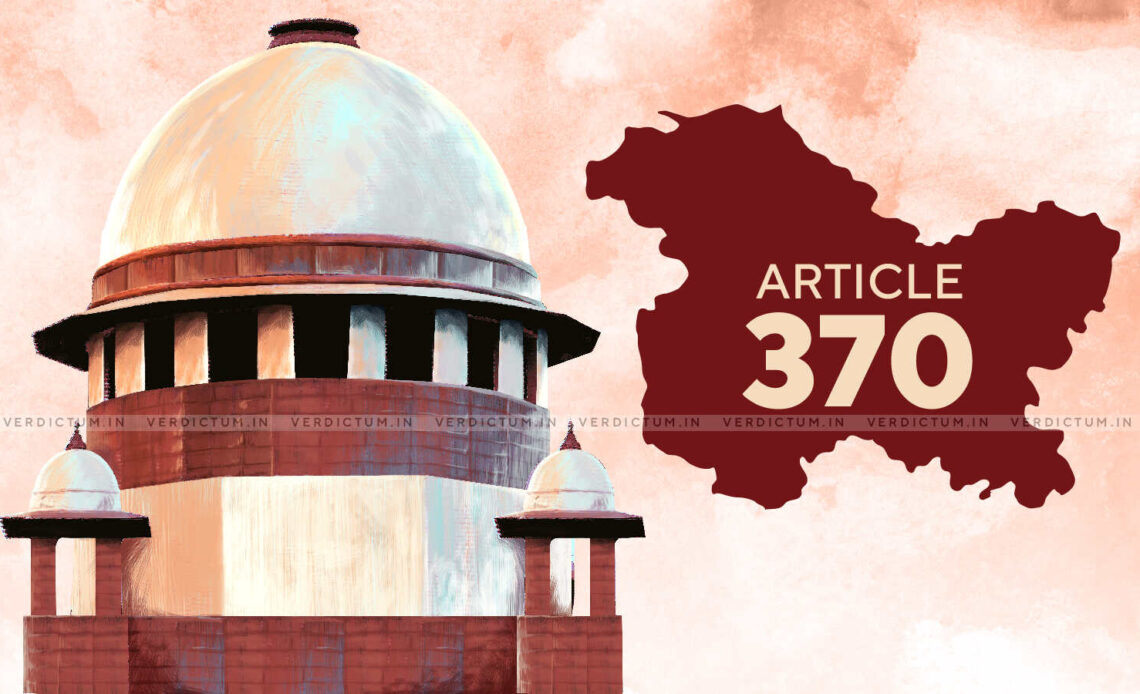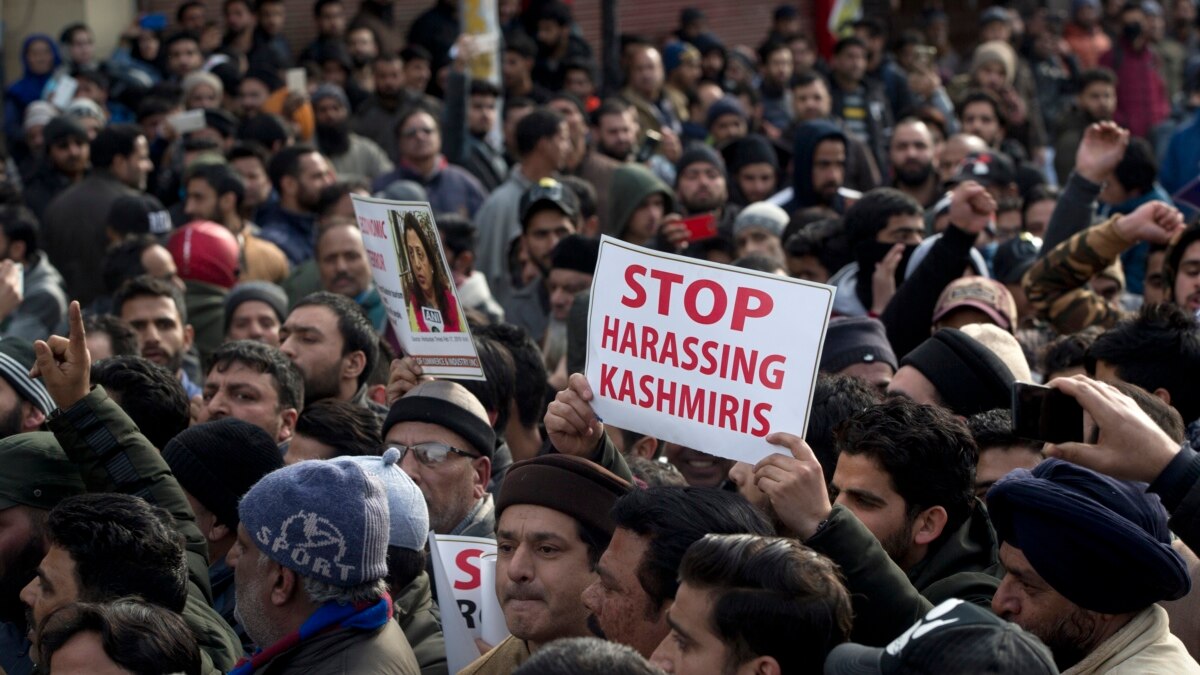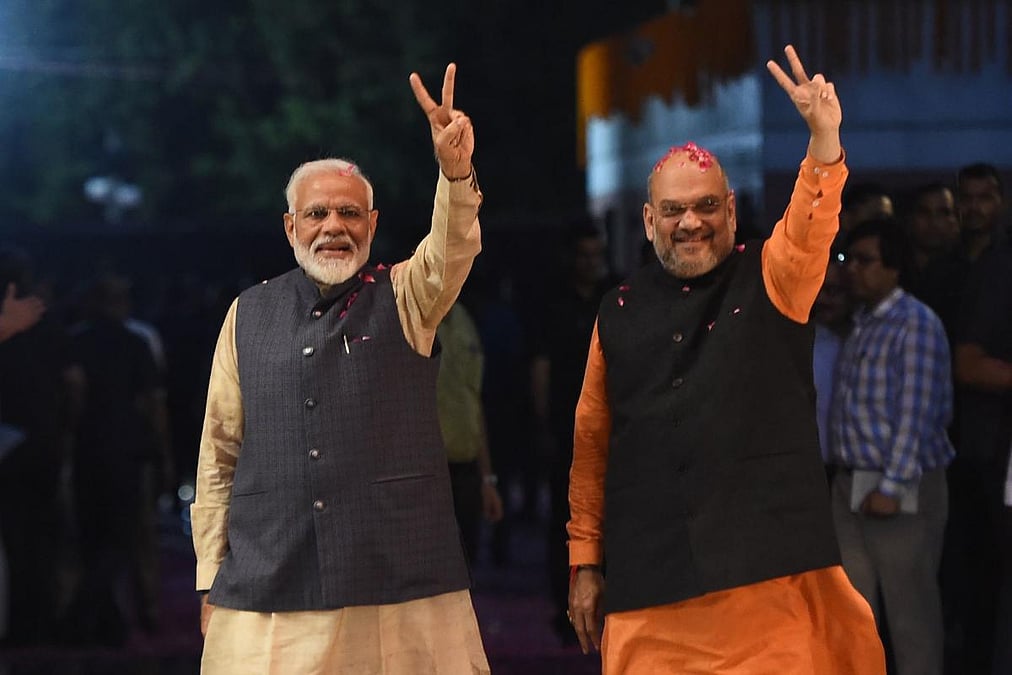
On December 11, India’s top court gave a historic verdict upholding the BJP government’s decision to abrogate Article 370. It was not a regular judgement, as the ruling of the five-judge bench, included some extremely important observations and remarks which will be echoed and used in the legal and political spectrum for a very long time. Now, although the judgement helps in closing a long-borne issue, in some aspects also sets a dangerous precedent against federalism, which is open for misuse in the future. In my Blog, I will analyse the ruling, its implications and the way forward.
A Brief Catchup
After independence, accession to different provinces was an uphill task for the newly sovereign state of India. Of course, every province was given the option to accede into India, and Pakistan or stay independent. But, when you are surrounded by ‘not-so-friendly’ neighbours, you can’t have the liberty of having Pakistani provinces or pro-Pakistan neutral provinces governing within India. For example just imagine, if Hyderabad, Junagarh or other few places would have gone to Pakistan (which there were chances of) how big a security concern it would have been for India.
In that scenario, it was very important to make these provinces accede to India using diplomacy and strong force (if needed). While the process in almost all other provinces concluded peacefully, there was one province, where the game was going to be a long one. ‘Jammu and Kashmir’. Maharaja Hari Singh, the ruler of Kashmir initially wanted to remain a sovereign country, but when tribal militias from Pakistan (of course sent by them) tried to invade Kashmir, Singh requested India for help. On this, India’s clear stand was that it can only help if J-K accedes into India. Finally, after much diplomacy, Maharaja Hari Singh signed the instrument of accession,
Following accession, India airlifted its troops to Srinagar, after which started the first Kashmir war between two newly independent nations — India and Pakistan. Hari Singh had started losing control of many of his own districts before accession. Now, that can’t happen unless a significant section of your territory is vividly supporting Pakistan, which, unfortunately, was the case here. Eventually, after months of fighting, a ceasefire was reached with Pakistan occupying parts of Kashmir, but India was able to retain Srinagar and other crucial areas.
There are a few things that are very important to note here, J-K has a majority Muslim population with over 90% in Kashmir (in fact only such state in India, barring tiny Lakshadweep). That was precisely the reason, Hari Singh didn’t want to accede to a Hindu-majority country or even a Muslim-majority one for that matter. Looking at this only, PM Jawaharlal Nehru even promised a plebiscite which never happened. Eventually, for a peaceful and smooth transition of a Muslim-majority J&K into a broadly Hindu-majority but secular India, Article 370 was executed — which gave J&K a separate constituent assembly, state flag, separate constitution and some internal autonomy — and restricted New Delhi’s control to matters of defence, external affairs and communication.
Long being a debated issue, finally, the Bharatiya Janata Party government in 2019 made a bold and historic decision to abrogate Articles 370 and 35(A) which gave special powers to the state. The assembly was already dissolved, so the Modi government — who was one of the strongest opposers of the article since the start — used the powers of the President, who actually exercised the powers to abrogate the article. Facing stiff criticism since then, the matter finally reached the Supreme Court.

Article 370 was one of Jawaharlal Nehru’s ideas that stirred the country for a very long time (Photo: India Today)
“No Internal Sovereignty”
In a major remark, the Chief Justice clearly stated that after its accession into India, J&K retained “no internal sovereignty”. In my opinion, this was just the last nail in the coffin as it has finally ended all sorts of debate regarding the special provisions for the J-K province. And, this very remark will be used every time, someone will ever try to restart any discussion over it.
Justice Chandrachud said that Article 370 was merely a “feature of asymmetric federalism” similar to other provisions in the Constitution such as Articles 371 to 371J — Maharashtra, Andhra Pradesh, Gujarat, Telangana, Sikkim, Mizoram, Arunachal Pradesh, Assam, Nagaland, Goa, Manipur and Karnataka — regarding special arrangements. He also mentioned that if J&K has sovereignty just by virtue of Article 370, so do all these other states, which is “clearly not the case”.
However, Justice Kaul in his concurring opinion, held that J&K did retain an element of internal sovereignty despite Maharaja Hari Singh signing the Instrument of Accession with India, which is evident from the fact that Article 370 recognises the Constituent Assembly of J&K. However, Justice Kaul also stated that this arrangement was “temporary” and was only meant to eventually “derecognise” this internal sovereignty.

Visual from one of the many fierce protests in Kashmir (Photo: VOA)
Power of the President
Regarding the President’s decisions exercised during this whole episode, the court rejected the argument of the petitioners that the President cannot take actions with ‘irreversible’ consequences in the State during the President’s rule under Article 356 of the Constitution. The court said that once the assembly is dissolved, and Article 356 is enforced, innumerable decisions need to be taken by the Union Government on behalf of the State Government for the purpose of day-to-day administration and if this power gets challenged on the ground of irreversibility, it would open the way for challenging everyday administrative actions leading to “chaos and uncertainty”.
However, the court also gave some ‘words of caution’. Justice Chandrachud stated that the exercise of the President (under the President’s Rule) must have a “reasonable nexus to the object of the Proclamation”. Justice Sanjiv Khanna, from the bench, elaborated a bit more. He said that a State’s conversion into a Union territory has “grave consequences, denies the State’s citizens an elected government, and impinges on federalism”. He added that such a conversion has to be justified by giving “very strong and cogent grounds”.

A tense moment in Kashmir with one of the many lockdown-like situations (Photo: The Wire)
Shortcomings of the Judgement
Now, this part of the judgement is ‘problematic’ in my opinion. Because, if the court states that after imposing the President’s Rule, the President on the central government’s behalf can do whatever it wants, so that ‘day-to-day administration’ is not disturbed, it is literally opening up a pandora’s box. This pandora’s box can lead to a range of “hostile and irrevocable” actions in the absence of an electoral body having “grave consequences” for the people.
From now on, any party at the centre with a huge majority can misuse its powers to dissolve assemblies (knowing how frequently defections happen these days and how easily a strong party can make other governments fall) and carve out any part as another state or UT without even consulting the assembly or taking people’s will into consideration. This act strongly infringes on federal principles and the court should have taken note of that. Now, here I am not imposing that the court should have struck down the government’s move, but at least I expected the country’s top court to strongly reprimand the government for the way it was done.

The fierce duo of Modi-Shah took the bold and historic step to abrogate Article 370 (Photo: Deccan Herald)
Role of J&K Assembly
A major criticism of the BJP government’s 2019 action was that the J&K assembly was not made a stakeholder in the whole process, and was not even consulted for that matter. Here again, the court said that the President can “unilaterally” notify that Article 370 ceases to exist exercising the powers under Article 370(3). Notably, Article 370(3) stopped the Centre from amending Article 370 without the J&K assembly’s approval, but this clause wasn’t operational after the J&K Constituent Assembly was dissolved in 1957. The centre had claimed that the President was well within his rights to exercise the powers under Article 370(1)(d) which gave an “exception” for the President to make decisions concerning the state.
“Since the effect of applying all the provisions of the Constitution to Jammu and Kashmir through the exercise of power under Article 370(1)(d) is the same as issuing a notification under Article 370(3), that Article 370 ceases to exist, the principle of consultation and collaboration is not required to be followed,” the court stated.
The court observed that even after the dissolution of the Constituent Assembly of J&K on January 26, 1957, the power of the President to abrogate Article 370 under Article 370(3) subsists and could be exercised “unilaterally”. It opined that such a provision was intended to “enhance constitutional integration between the Union and the State of Jammu and Kashmir”. Justice Kaul also said that the ‘purpose’ of Article 370 was to slowly bring J&K on par with other Indian states and thus the requirement of recommendation of J&K Constituent Assembly “cannot be read in a manner making the larger intention redundant”.
Assembly Elections
Another important observation by the top court was regarding the holding of Assembly elections in Jammu and Kashmir. While Ladakh has been made a UT like most others, J&K has been made a UT with an assembly (similar to Delhi). It was promised that an election would be held there (speculations even called it in 2023 itself), but it hasn’t happened so far. The top court has asserted that J&K’s statehood should be restored “as soon as possible” and rightly ordered that assembly elections should be held there by September 30, 2024.
This is a welcome move in every aspect. We know that J&K has been perhaps the only issue, where at times, we have been questioned by outside countries too. There is a whole lobby that intends to portray us instead, as the “occupying forces”. So, we need precise manoeuvring in terms of decision-making. Having an assembly election and a properly elected government in place is the best case scenario, to strongly present our case internationally.

Visual from the historic Truth and Reconciliation Commission from South Africa (Photo: X)
Truth and Reconciliation Commission
In what seemed a very welcome step, Justice Sanjay Kaul in his concurring opinion mooted the constitution of a Truth-and-Reconciliation Commission to address “human rights violations both by state and non-state actors” in Jammu and Kashmir since the 1980s.
Now, we all know about the horrific persecution of the Kashmiri Pandits by the insurgents (non-state actors), which is no less than a disgrace to us. But, the second part of the sentence, in my opinion, is ‘extremely important’, as it acknowledges the violations by “state actors” too. Now, many jingoistic minds might put a sword on my neck, but there have been cases of excesses by military personnel and other officials, especially against local Kashmiris and this remark is a strong acknowledgement of that.
This idea is very much in line with the one established in South Africa after the apartheid. There too, Nelson Mandela was very clear that he didn’t want to punish the perpetrators but instead focussed on bringing our unheard stories of struggle and pain. People came out with live broadcasts, telling their painful stories and confessing their horrific crimes. Just like any policy, there have been some flaws here too, but this practice is very well considered a crucial component in making South Africa a ‘full and free’ democracy. And I can just hope that a similar result be achieved for the people of J&K.
Justice Kaul stated that it “was up to the government” to decide how the Commission must be set up, but also cautioned that once it is constituted, it “should not turn into a criminal court” and instead offer a platform for dialogue. This is again, a very important statement. In India, as soon as something like this is set up (if), different factions won’t waste any time in finding ‘villains’ as per their convenience and mindset. So, it is very important that the commission plays the role of unearthing unheard stories and then focuses on reconciliation, inclusion and co-existence of Hindus and Muslims in the valley as was the case long back in history.
“J&K was, is and will remain an integral part of India”
Despite, strong disagreements overall, I have always supported BJP’s stand on abrogating Article 370. Firstly, how can we be a fully democratic country and provide special provisions (even at times when not needed) to just a certain state? Isn’t it unfair on other states of India? Secondly, it was always a “temporary provision”, so those shedding crocodile tears should look that out too. So, this article needed to go. And, Amit Shah once rightly said, those standing for the restoration of 370 can’t even point to one reason, why it should be there in the first place.
However, despite doing the righteous thing, the court missed out on certain aspects. It completely ignored a “potent attack” on federalism as if nothing happened setting a dangerous precedent which is open to grave misuse in future. So, in my opinion, it is overall an important judgment which has finally laid the long-debated issue to rest. Now, the debate can finally shift from ‘370’ to the policies being implemented there and the progress of the state. I hope the elections in J&K are held timely and fairly with more federal powers. I also look forward to some government (definitely not this) setting up a Truth and Reconciliation Commission to heal the past wounds and make an inclusive society in Jammu and Kashmir to finally move forward for as beautiful a future as its locales.

